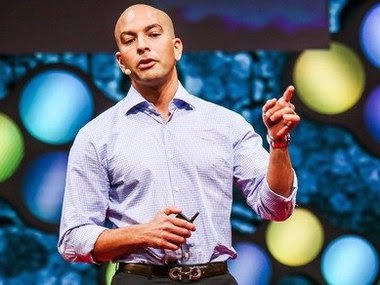"I will always, always, always be there. I will see you through this. I will never abandon you. I will be with you through the end." ~~ A Doctor's Message
Good Morning Folks,
Our quest to build a healthy company and to achieve of our 2016 goal begins with each of us. Our employees are our number one asset. So, as I screened TED talks last weekend in hope of finding one to share today, it occurred to me that being "healthy" is more than measurements in profits and cash flow, but also with regard to the health and wellness of all of our associates. "A Doctor's Touch" seemed like the perfect share.
Modern medicine is in danger of losing a powerful, old-fashioned tool: human touch. Physician and writer Abraham Verghese describes our strange new world where patients are merely data points, and calls for a return to the traditional one-on-one physical exam.
In short, it is just good medicine. Moreover, it is what most patients want.
I think this Ted talk touched on an interesting trend. With an increase in the technology available to treat disease, it becomes all to easy for physicians to take a step back from physical examinations and patient care. I thought Dr. Verghese it the nail on the head when he started talking about an IPatient because in a way that is what medicine as evolved into. Doctors sometimes care more about the images they get from their scans then the actual patient themselves. This isn’t their fault, or necessarily a bad thing. A doctors job is to treat a patient the best they can, so sometimes that does mean spending less time on things like a physical exam, and instead focusing on getting as many scans as possible. I do believe though that while we should be grateful of our technological advances, doctors shouldn’t neglect some of the foundations of modern medicine.
Dr. Verghese explains, "And the real tragedy was, if you look through her records, she had been seen in four or five other health care institutions in the preceding two years. Four or five opportunities to see the breast masses, touch the breast mass, intervene at a much earlier stage than when we saw her. And the message, which I didn't fully understand then, even as I delivered it, and which I understand better now is this: I will always, always, always be there. I will see you through this. I will never abandon you. I will be with you through the end." Have a look:
Dr. Verghese says: “I still find the best way to understand a hospitalized patient is not by staring at the computer screen but by going to see the patient; it's only at the bedside that I can figure out what is important.” In our era of the patient-as-data-point, Abraham Verges believes in the old-fashioned physical exam, the bedside chat, the power of informed observation.
"The truth is, I love and embrace technology, and have no desire to return to the pre-CAT scan and pre-MRI days of old. But I see no reason to let new technology make us lose the abilities we have had for over a hundred years to make sophisticated diagnosis at the bedside. Indeed, it should make us so much better."
I thoroughly enjoyed this video and all the ideas that were presented within it. I hope that you did too.
*TED is a nonprofit devoted to Ideas Worth Spreading. It started out (in 1984) as a conference bringing together people from three worlds: Technology, Entertainment, Design. Since then its scope has become ever broader. Along with two annual conferences -- the TED Conference on the West Coast each spring, and the TEDGlobal conference in Edinburgh UK each summer -- TED includes the award-winning TED Talks video site, the Open Translation Project and TED Conversations, the inspiring TED Fellows and TEDx programs, and the annual TED Prize. More at TED.com






